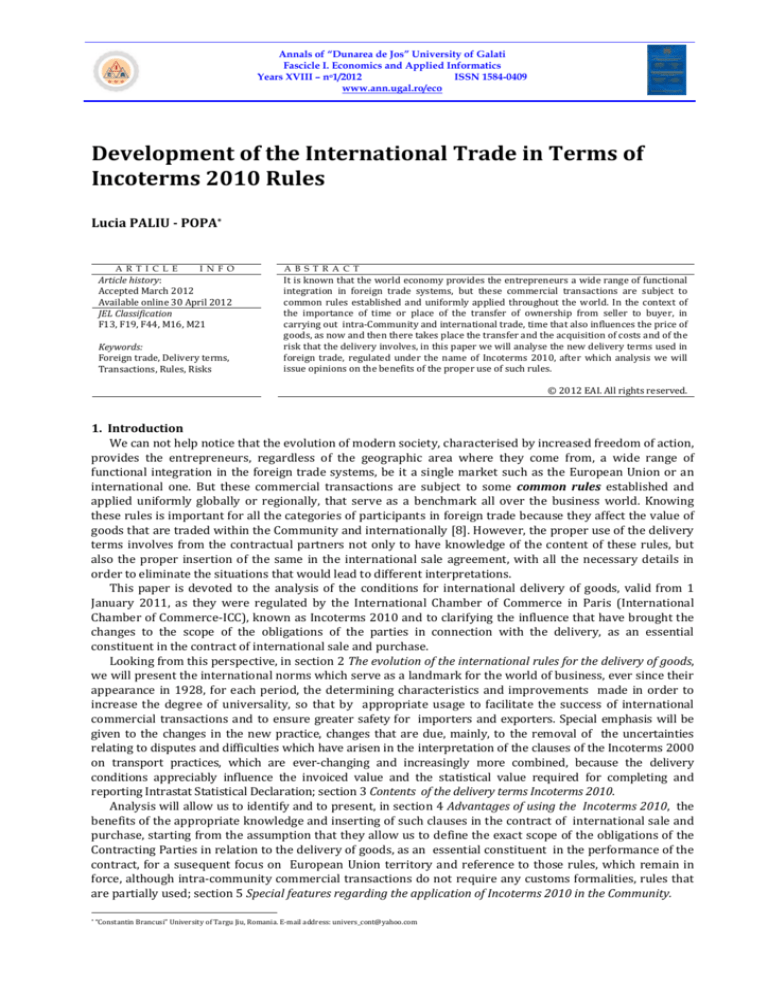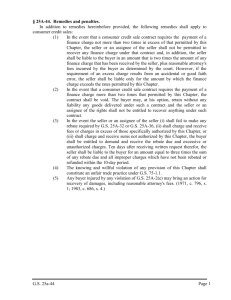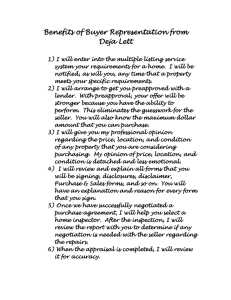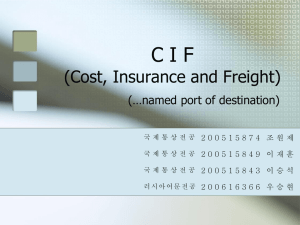
Annals of “Dunarea de Jos” University of Galati
Fascicle I. Economics and Applied Informatics
Years XVIII – no1/2012
ISSN 1584-0409
www.ann.ugal.ro/eco
Development of the International Trade in Terms of
Incoterms 2010 Rules
Lucia PALIU - POPA*
A R T I C L E
I N F O
Article history:
Accepted March 2012
Available online 30 April 2012
JEL Classification
F13, F19, F44, M16, M21
Keywords:
Foreign trade, Delivery terms,
Transactions, Rules, Risks
A B S T R A C T
It is known that the world economy provides the entrepreneurs a wide range of functional
integration in foreign trade systems, but these commercial transactions are subject to
common rules established and uniformly applied throughout the world. In the context of
the importance of time or place of the transfer of ownership from seller to buyer, in
carrying out intra-Community and international trade, time that also influences the price of
goods, as now and then there takes place the transfer and the acquisition of costs and of the
risk that the delivery involves, in this paper we will analyse the new delivery terms used in
foreign trade, regulated under the name of Incoterms 2010, after which analysis we will
issue opinions on the benefits of the proper use of such rules.
© 2012 EAI. All rights reserved.
1. Introduction
We can not help notice that the evolution of modern society, characterised by increased freedom of action,
provides the entrepreneurs, regardless of the geographic area where they come from, a wide range of
functional integration in the foreign trade systems, be it a single market such as the European Union or an
international one. But these commercial transactions are subject to some common rules established and
applied uniformly globally or regionally, that serve as a benchmark all over the business world. Knowing
these rules is important for all the categories of participants in foreign trade because they affect the value of
goods that are traded within the Community and internationally [8]. However, the proper use of the delivery
terms involves from the contractual partners not only to have knowledge of the content of these rules, but
also the proper insertion of the same in the international sale agreement, with all the necessary details in
order to eliminate the situations that would lead to different interpretations.
This paper is devoted to the analysis of the conditions for international delivery of goods, valid from 1
January 2011, as they were regulated by the International Chamber of Commerce in Paris (International
Chamber of Commerce-ICC), known as Incoterms 2010 and to clarifying the influence that have brought the
changes to the scope of the obligations of the parties in connection with the delivery, as an essential
constituent in the contract of international sale and purchase.
Looking from this perspective, in section 2 The evolution of the international rules for the delivery of goods,
we will present the international norms which serve as a landmark for the world of business, ever since their
appearance in 1928, for each period, the determining characteristics and improvements made in order to
increase the degree of universality, so that by appropriate usage to facilitate the success of international
commercial transactions and to ensure greater safety for importers and exporters. Special emphasis will be
given to the changes in the new practice, changes that are due, mainly, to the removal of the uncertainties
relating to disputes and difficulties which have arisen in the interpretation of the clauses of the Incoterms 2000
on transport practices, which are ever-changing and increasingly more combined, because the delivery
conditions appreciably influence the invoiced value and the statistical value required for completing and
reporting Intrastat Statistical Declaration; section 3 Contents of the delivery terms Incoterms 2010.
Analysis will allow us to identify and to present, in section 4 Advantages of using the Incoterms 2010, the
benefits of the appropriate knowledge and inserting of such clauses in the contract of international sale and
purchase, starting from the assumption that they allow us to define the exact scope of the obligations of the
Contracting Parties in relation to the delivery of goods, as an essential constituent in the performance of the
contract, for a susequent focus on European Union territory and reference to those rules, which remain in
force, although intra-community commercial transactions do not require any customs formalities, rules that
are partially used; section 5 Special features regarding the application of Incoterms 2010 in the Community.
*
“Constantin Brancusi” University of Targu Jiu, Romania. E-mail address: univers_cont@yahoo.com
As a result of the study we have conducted we will formulate relevant conclusions relating to the use of
uniform rules in international trade, so that economic operators can carry on trade under conditions of fair
and undistorted competition, and the advantages of inserting them in contracts be those expected by
contracting parties; section 6 Conclusions.
2. The evolution of the international rules for the delivery of goods
The rules or terms of delivery of goods were and are regulated by a series of international rules that serve
as a benchmark for the business world [2, 3, 11, 12].
Since 1928, on the initiative of the International Chamber of Commerce in Paris (ICC), in order to provide
traders with a set of international rules for interpreting the trading terms most commonly used in the
international trade and thus help simplify the transactions for the negotiation of the sale of goods and the
conclusion of the commercial agreement there has been developed a series of six terms of delivery or
commercial terms which setting up rules for the uniform interpretation of obligations, risks and responsibilities
in international sales, especially as they were uncertain and contradictory.
Later, in 1936, the International Chamber of Commerce in Paris has published a series of international rules
concerning the delivery, called INCOTERMS (International Commercial Terms) that include 11 international
trading terms [13], also known as “delivery clauses”, rules that were able to define the seller's and the buyer's
obligations better and more completely than in 1928, which is why Inconterms 1936 were accepted by most
merchants, less the British and Americans [4].
Simultaneously with the development of trade around the world, the “Working Commission for commercial
practices” of the International Chamber of Commerce in Paris, reviewed, complemented and systematised on
several occasions, namely: 1953, 1967, 1976, 1980, 1990, 2000 and 2010 the previous rules on uniform
interpretation of the clauses contained in the agreement of international sale of goods. However, the Vienna
Convention (1980) on international sale of goods governed the transfer of risk without any reference to the
transfer of ownership, because it was unlikely to establish a criterion making it possible to identify the time of
transfer of ownership, since the rules of law in many countries defined this time differently.
If in 1990 there was conducted a general review of the “Incoterms Rules”, which are different from the
version of 1980 by reducing the number of trading terms used, we can say that the 2000 version retains the
terms, but sets new rules on the conclusion of bilateral agreements regarding the changes in the remote
electronic transmission of commercial information.
We appreciate that gaps and uncertainties encountered and received by specialists in the development of
international trade before 2000, have led to the development of Incoterms 2000, where representatives
from the U.S. and Japan participated for the first time; the said countries that have their own commercial
practice regarding the development of international transactions; such participation has played a significant
role in increasing the universality of “Incoterms Rules”, rules with a more concise content, designed to
facilitate the success of international commercial transactions, giving more certainty to exporters and
importers. Please note that these rules intended to clarify certain aspects since the phase of negotiation and
conclusion of the international sale agreement; such agreement actually triggers all the conduct of future
operations and relates to: individualisation, packaging, carriage, insurance, customs clearance, circulation of
documents, payment, collection, etc. Thus, the Incoterms 2000 rules were able to overcome all borders,
representing a common language of business people, regardless of the market where they are used, with
direct implications on certain habits which bring a discordant note in the trade relations between Europe and
the Orient, Europe and the American continent, the American continent and the African continent etc.
We can not continue our approach presenting the terms of delivery of goods in foreign trade without
specifying that the United States of America adopted, since 1919, a Code of Practice on international trade,
which was revised in 1941, becoming “Revised American Foreign Trade Definitions”, or RAFTD, used in the
American space, especially in the U.S., Canada and Mexico, which includes six categories of terms, each
specifying the seller's and buyer's obligations.
However, Incoterms tend to impose a universal code, essentially representing the positions of
representatives of the two trends that are manifested in the international trade, namely: the “reforming”
trend, perceived as a new trend aimed at uniforming the global commercial practices in order to achieve a
wide opening, to allow participation in international transactions on favourable terms, of all countries of the
world and the “conservative” trend, supported in particular by some highly developed countries, trying to
maintain some advantageous practices, arising from the position of economic supremacy that they have
earned over time.
We can not help notice the tendency to generalise the Incoterms rules, a code of practice which has seen
significant improvements, an aspect supported by a specialised work published in the U.S., which
recommends even the American companies to replace Raftd with the Incoterms, in order to provide more
clarity to the definition of contractual terms and to better protect their commercial interests [9].
100
3. Contents of the delivery terms Incoterms 2010
Starting 1 January 2011 the new version of Incoterms 2010 came into force, aimed, in particular, at a
better understanding and ease of use of the delivery terms (The agreements concluded before such date
remain governed by the previous forms of Incoterms rules).
In fact, the delivery term is one of the essential terms of an international commercial agreement, thereby
regulating the transfer of goods and risks from seller to buyer, including the legal and economic
consequences generated [1]. We believe that the need to amend the terms of foreign trade in 2010 was due,
among other things, to the new reality of the countries within the Community, which as you know, within the
common Market instituted between the 27 European Union member states, ruled the free movement of goods,
capital and people.
Another argument in favour of Incoterms 2010 referred to the need to adapt the language used and the terms
used to the new realities of information technology, so that the new revision should take into account the electronic
commerce and the electronic system for invoicing and data transfer (Electronic Data Interchage), preparing the
current edition to better meet these increasingly ubiquitous realities. The new rules have also removed the
ambiguities related to the disputes and difficulties that have arisen in interpreting the Incoterms 2000 clauses
regarding the transportation practices, which are constantly changing and increasingly combined.
If the Incoterms 2000 rules comprise 13 delivery terms, which were grouped into four different categories,
taking as a criterion the main obligations of the seller, the Incoterms 2010 contain only 11 delivery terms,
sorted into two categories, according to the manner of use of transport. The main amendments to the delivery
terms, previously available, are presented below [7, 14, 15].
The main amendments contained in the Incoterms 2010 rules
there were two new delivery terms: Delivered at Terminal (DAT) and Delivered at Place (DAP);
four delivery terms have been removed: DEQ, DAF, DES, DDU;
the delivery term DAP replaces the delivery terms DAF, DES, DDU;
the delivery term DAT replaces the delivery term DEQ;
the delivery terms have been grouped into two categories, namely: general terms applicable to all types of transport,
namely: shipping, rail, road, air, postal, by fixed transport installations, naval on inland waterways and self-propelled drive
(EXW, FCA, CPT, CIP, DAT, DAP, DDP) and special terms for transport by sea and inland waterway (FAS, FOB, CFR, CIF);
the delivery place for the existing terms FOB, CFR and CIF has been redefined. Thus, according to Incoterms 2010, the goods
are considered delivered only when they are brought on board, unlike the previous rules providing that the delivery is
performed as soon as the goods have passed the ship's rail. Note that in this case as well it is required to specify the exact
place, namely the port and, in certain circumstances the port sector where the goods have to be loaded, provided that, where
the delivery term FOB is used, but no port is defined, the seller has the right to choose the place.
Although the ICC states that the latest available version of Incoterms is always used, unless otherwise
provided, theoretically, the sale agreements may be concluded, as before, based on previous versions,
provided that the seller and the buyer clearly define in the agreement concluded which is the Incoterms
version that the transaction is based on.
To achieve an overall picture of the delivery terms that may be used, according to ICC, both in the
international and national sale agreements, the new Incoterms 2010 rules are presented below, according to the
modes of transport used (Table 1).
Table 1. Delivery terms INCOTERMS 2010
Mode of
transport
For all types of
transport
For transport by
sea and inland
waterway
Delivery term
EX Works ...
Free Carrier ...
Carriage Paid To ...
Carriage Insurance Paid ...
Delivered at Terminal ...
Delivered at Place …
Delivered Duty Paid …
Free Alongside Ship …
Free On Board ...
Cost and Freight ...
Cost, Insurance, Freight ...
Abbreviation
EXW
FCA
CPT
CIP
DAT
DAP
DDP
FAS
FOB
CFR
CIF
101
To understand their responsibilities incumbent in carrying out international commercial agreements for
the sale of goods, the knowledge of Incoterms rules is important to all the categories of participants in
international trade, as the delivery terms significantly influence both the invoice value and the statistical
value required for filling out and reporting the Intrastat Statistical Declaration [14, 15]. Given that the correct
use of Incoterms involves from the trading partners, in addition to the knowledge of the content of such
terms, their inclusion in the sale agreement, with all the necessary details, we considered appropriate to
briefly present below the content of the new rules Incoterms 2010, entered into force on 1 January 2011
(Table 2).
Table 2. Content of the delivery terms INCOTERMS 2010
No.
1.
2.
Delivery
term
•
is the delivery term most convenient for the seller who has to provide the goods packed
to the buyer at the specified place (plant, factory, warehouse, etc.), without completing the
export formalities and without loading in any means of carriage;
•
the products and risks are transferred to the buyer, including the carriage and insurance
payments, from the seller's factory gate; the same shall bear: the carriage through the
exporter's (seller) country, the export customs clearance, international road transport and
insurance, transit fees in the countries crossed by the means of transport, the customs
clearance in the importer's (buyer) country, the unloading and transport costs to the final
destination of the goods.
•
the seller fulfils his obligation to deliver when he delivered the goods cleared for export in
the care of the designated carrier, at the place or point agreed; the latter also takes the costs
and risks from the seller;
FCA
•
Franco
carrier
if the buyer fails to indicate a precise point, the seller may choose the place or jurisdiction where
the carrier is to take the goods in custody;
•
if the buyer designates a person other than the carrier to take the goods, the seller's obligation
shall be deemed to be fulfilled as soon as this person has taken such goods; the seller shall not
take the risks for the main transport;
•
when, according to the commercial practice, the seller's support is necessary to conclude
the agreement with the carrier, the seller acts on the buyer's risk and expense.
•
the transport of goods to the agreed destination shall be borne by the seller;
•
risks of loss or damage to the goods, and any other additional costs due to events
occurring after the goods have been delivered to the carrier, pass from the seller to the
buyer when the goods have been delivered to the carrier;
•
if for transporting the goods successive carriers are used, the risks pass from the seller to
the buyer when the goods are entrusted to the first carrier;
•
the seller has the obligation to clear the goods for export.
•
the seller has the same obligations as for the delivery term CPT, but additionally, he must
also carry out the insurance to cover the risk of loss or damage to the goods during
transportation, which is why he concludes the agreements and pays the insurance
premium;
•
the insurance policy purchased by the seller has minimum coverage, and he must also
fulfil the customs formalities;
•
the risks of loss or damage to the goods are transferred from the seller to the buyer after
they have been delivered to the carrier, and any damage found at the destination is to be
recovered by the buyer from the insurer.
•
the seller delivers and unloads the goods from the means of transport to the terminal (the
port or place) established with the buyer; the terminal means any place, such as: wharf,
store, street, cargo terminal, railway terminal;
EXW
EX Works
CPT
3.
Content of the delivery term
Carriage
Paid to
CIP
4.
Carriage
Insurance
Paid
DAT
5.
Delivered
•
at Terminal
•
because the seller covers all the costs for delivery and unloading of the goods at the
terminal set, it is recommended that the term “Terminal” should be very well defined;
DAT cover the customs formalities for export but does not include the cost of import
102
No.
Delivery
term
Content of the delivery term
customs formalities, the buyer is required to carry out the customs formalities for import
and to pay related taxes (customs duties and other import related charges).
•
the goods are delivered by the seller in the appropriate transport means, at the place
agreed with the buyer, the seller covers all costs for the delivery of goods at such place;
•
if the seller bears the cost related to unloading goods at the destination, he shall not be
entitled to re-invoiced such amounts to the buyer;
•
DAP covers the customs formalities for export but does not include the cost of import
customs formalities, which is the buyer's responsibility.
•
the seller fulfils his obligation to deliver when the goods were made available to the buyer at
the specified place in the importing country, unloaded from the means of transport and
customs cleared for import;
•
In this situation the seller bears all costs and risks of bringing goods to the agreed place,
including the customs duties, and other official charges and taxes needed for the import
and the costs and risks related to the completion of customs formalities;
•
the import license is obtained by the seller, directly or indirectly.
•
Free
Alongside
Ship
the obligation to delivery is fulfilled by the seller when the goods are placed along the
ship on the wharf or lighters, barges or ferry, brought near the ship in the agreed port of
shipment, when the transfer of costs and risks from the seller to the buyer also takes
place;
•
although the term FAS requires the seller to deal with the customs clearance for export,
the parties may agree, by an explicit clause in the agreement, that the same should come
under the buyer's responsibility.
FOB
•
the seller fulfils his obligation to deliver as soon as the goods have passed the ship's rail, in
the agreed port of shipment, when all the costs and risks of loss or damage to goods are
transferred to the buyer;
•
the FOB term requires the seller to clear the goods for export.
•
according to this term, the seller fulfils his obligation to deliver the goods when they pass the
ship's rail, in the port agreed;
•
the seller bears the freight and costs to bring the goods in the port of destination agreed, but
the risk of loss and damage, as well as any additional costs due to events occurring after the
goods have been delivered on board are transferred from the seller to the buyer;
•
therefore there is a separation between the time and place of risk transfer (in the port of
shipment) and the cost transfer (in the port of destination);
•
the seller is required to prepare the customs formalities for export and the beneficiary
shall bear the insurance of goods.
•
the seller fulfils his obligation to deliver the goods when they pass the ship's rail in the
port of shipment;
•
the seller is responsible for both the freight of goods to the agreed port of destination and
the cost of insuring the risks of loss or damage to goods during transportation;
DAP
6.
Delivered
at Place
DDP
7.
Delivered
Duty Paid
FAS
8.
9.
Franco on
Board
CFR
10.
Cost and
Freight
CIF
11.
Cost,
Insurance, •
Freight
•
the risks and additional causes due to incidents occurring after delivery are transferred to
the buyer's account;
the seller is required to fulfil the customs formalities for export and to contract an insurance
policy with minimum coverage without taking over the risks.
We believe that the Incoterms rules are a useful guide for entities undertaking international commercial
transactions, as they make it possible to define the exact extent of obligations of the parties in connection with the
delivery, as an essential component in the development of the international sale agreement [6].
103
4. Advantages of using the Incoterms 2010
After analysing the content of the Incoterms delivery terms we consider it justified to say that their use
has several advantages for the contractual partners, such as [9]:
The rules Incoterms 2010 make it possible to rigorously determine the seller's and the buyer's
responsibilities in carrying out the operations involved by the delivery. If we consider that the
obligations of partners in foreign trade transactions translate into costs incurred, which is reflected in the
contract price, we felt it justified to present below the allocation of costs between the buyer and the seller
(Table 3).
Table 3. Allocation of costs between buyer and seller
EXW
FCA
FAS
FOB
CFR
CIF
CPT
CIP
DAT
DAP
DDP
INCOTERMS
2010
•
•
•
•
•
•
•
•
•
•
•
°
•
•
•
•
•
•
•
•
•
•
°
•
•
•
•
•
•
•
•
•
•
°
•
•
•
•
•
•
•
•
•
•
°
°
°
•
°
•
•
•
•
•
•
•
Main transport
°
°
°
°
•
•
•
•
•
Transport insurance
°
°
°
°
°
•
°
•
•
°
°
°
°
°
°
•
°
•
°
°
°
°
°
°
°
°
•
°
°
°
°
°
°
°
°
•
°
°
°
°
°
°
°
°
°
COSTS
Packaging individualisation
Loading (truck, car)
Container loading in plant or
warehouse of departure
Shift/movement near the port,
airport, terminal, load platform:
departure terminal
Export customs formalities
Transhipment (passage) inside the
port, airport, platform, load
warehouse, departure terminal
Use / inside passage, ports, airport,
warehouse/load platform, arrival
°
°
terminal
Import customs formalities (duties
°
°
and taxes)
Travel to the domicile or warehouse
°
°
on arrival
Unloading at the domicile (plant) or
°
°
warehouse on arrival
• - Costs borne by the seller
•
°
•
°
•
•
° - Costs borne by the buyer
Source: Adapted from Commercial Rules and Practice INCOTERMS 2000, Percomex SA, page 55 and Order no. 21/2011 of the president of the
National Institute of Statistics on approval of the Completion rules for the Intrastat Statistical Declaration
Although they do not govern the transfer of ownership, the Incoterms rules provide a clear solution about
using the term “risk transfer”, according to which the partner, party of the agreement to which the risk is
situated or that took it over, is required to insure the good whether the same owns it or not, so that in the
event of damage, neither the buyer nor the seller should incur any damage, regardless of when the
ownership is transferred.
The delivery terms of Incoterms goods establish the parties' obligations relating to the procurement
and preparation of the documents ensuring the delivery of goods, such as: invoice, packing list, export
license, certificate of inspection of goods, certificate of origin, consular invoice, document certifying
delivery, transport document, insurance policy, import license (Table 4) [5, 10].
104
CIP
v
(v)
v
c
DDP
...
v
(v)
v
c
DAP
v
(v)
v
c
CPT
...
v
(v)
v
c
CIF
v
(v)
v
c
DAT
...
v
(v)
v
c
CFR
...
v
(v)
v
c
FOB
...
v
(v)
c
c
FAS
FCA
...
INCOTERMS
2010
DOCUMENTS
Invoice
Packing list
Export license *
Inspection certificate*
EXW
...
Table 4 Documents required in compliance with INCOTERMS
v
(v)
v
c
v
(v)
v
c
v
(v)
v
c
DAT
...
DAP
DDP
...
(c)
(c)
(c)
(c)
(c)
(c)
(c)
(c)
(c)
(c)
(c)
(c)
(c)
(c)
(v)
(v)
c
v
v
v
-
-
-
-
v
v
v
(c)
c
c
c
v
v
v
v
v
v
v
Insurance policy
(c)
(c)
(c)
(c)
(c)
v
(c)
v
(v)
(v)
(c)
(v)
Import license*
c
c
c
c
c
c
c
c
c
c
v
CIP
CFR
...
(c)
(c)
CPT
...
FOB
...
(c)
(c)
CIF
FCA
...
(c)
(c)
FAS
EXW
...
INCOTERMS
2010
DOCUMENTS
Certificate of origin*
Consular invoice*
Documents certifying the
delivery
Transport document
Legend:
v = documents at the expense of the seller
c = documents at the expense of the buyer
( ) = Incoterms does not specify who will bear the document
* = if applicable
Source: Popa, I., op. cit., page 231 adapted from Chevalier, D., Memo Guide, Moci, no. 3/1999
The correct use of Incoterms delivery terms involves from the contractual partners not only knowledge of
the contents of such rules, but also their proper insertion in the international sale agreement, with all the
necessary details. Starting from the consideration that the implementation of each specification, within the
various methods of delivery of goods, represents costs that may not be neglected, it is very important to know
who is the contractual partner who pays and also, how much he/she pays, as any omission or lack of
specification in this regard may diminish or even cancel the benefits expected by the seller or buyer, on the
completion of such transactions.
5. Special features regarding the application of Incoterms 2010 in the Community
If we pay attention to the intra-Community commercial transactions, within the Common Market of the
European Union the free movement of goods between the 27 member states has been ruled; mutual
exchanges are exempt from all customs duties. Because there are no customs interferences and hence no
customs formalities in carrying out intra-Community acquisitions and supplies, leading to the levying of
customs duties, it would seem that the application of Incoterms delivery terms is no longer necessary.
However, the rules remain in effect and therefore apply in trading that does not require any customs
formality, referring here both to intra-Community and national transactions.
The need to apply the Incoterms for the intra-Community trade is confirmed by the method of filling out
the Intrastat Statistical Declaration, which uses the “Incoterms-2010” terminology used on the conclusion of
commercial agreements, provided that the Community contractual partners have all the 11 delivery terms,
which they may choose, depending on the objective pursued. Considering the geographical position of the
Community countries, we can not help notice that the ground (road, rail) and air shipments will be given
priority, without excluding the sea shipment, which may be used in the trade relations with the Greek
ports. But practically speaking, only part of these rules are used routinely in commercial transactions
within the Community. When referring to the EXW term, we appreciate that it is not used in the Community
trade as, in practical terms, the seller undertakes the operation of loading the goods; the buyer exceptionally
undertakes the same. Also, because the preparation of customs formalities is no longer necessary, the use in
commercial transactions of the delivery terms DAP and DDP takes one direction, both automatically including the
unloading operations costs, situations where the seller must deliver at the destination, in the place agreed, the
goods free of any obligations and costs.
6. Conclusions
We can not help notice the constant concern for the ICC to establish the bases of uniform rules, that would
base an orderly development of the international trade, international rules that serve as a benchmark for the
business world, so that the economic operators conducting international commercial transactions may trade
with each other, in terms of fair and undistorted competition. In this context, we consider that the Incoterms
rules, which, with the passage of the goods from the seller to the buyer, determine, among other things, where
and when takes place the transfer of costs and risks involved in the delivery, affect the external prices which
are to be negotiated between the contractual partners, which is why these delivery terms, which clearly define
the obligations of the parties and reduce the risk of legal complications, have to be knowingly chosen, depending
on the objective pursued by each party of the agreement.
105
Commenting on this situation, we must specify that the correct use of the Incoterms 2010 delivery terms
involves from the contractual partners not only the knowledge of the content of such rules, but also their
proper insertion in the international sale agreement, with all the necessary details, as any omission or lack of
specification in this regard may diminish or even cancel the benefits expected by the seller or buyer on the
completion of such transactions.
References
1.
2.
3.
4.
5.
6.
7.
8.
9.
10.
11.
12.
13.
14.
15.
Bergami, R., Incoterms 2010: the Newest Revision of Delivery Terms, CITEM 2010 Conference Proceedings, University of South Bohemia
and VU, Ceske Budejovice, Czech Republic, 2010
Blănaru, C. A., Comerţ exterior al României în contextul integrării europene [Romania's Foreign Trade in the Context of European
Integration], Alfa Publishing House, Iasi, 2009
Burciu, A., coordinator, Tranzacţii comerciale internaţionale [International Commercial Transactions], Polirom Publishing House, Iasi, 2010
Caraiani, G., Mihei, A., Gearâp, T., Condiţia de livrare în tranzacţiile internaţionale [The Delivery Term in International Transactions], Lumina Lex
Publishing House, Bucharest, 2001
Isai,V., Radu R.I., Importance of Delivery Conditions in the External Price Calculation, The Annals of “Dunarea de Jos” University of Galaţi,
Economics and Applied Informatics, Year XI, Fascicle I - 2005
Paliu-Popa Lucia, Consideraţii privind condiţiile de livrare a mărfurilor în comerţul internaţional [Considerations on the Terms of Delivery of Goods in
International Trade], Volume International Conference on Applied Business & Economics, Thessaloniki, Greece, 2008
Piltz, B., Incoterms 2010, München: Internationales Handelsrecht vol. 11, no. 1, 1-7, 2011
Pop, N. Al., Dumitru, I., Marketing internaţional [International Marketing], Uranus Publishing House, Bucharest, 2001
Popa, I., Tranzacţii de comerţ exterior [External Trade Transactions], Economic Publishing House, Bucharest, 2002
Radu, F., Paraschivescu, M.D., Contabilitatea operaţiunilor de comerţ exterior [Accounting of Foreign Trade Operations], Tehnopress
Publishing House, Iasi, 2007
Sută, N., coordinator, Comerţ internaţional şi politici comerciale contemporane [International Trade and Contemporary Trade Policies],
Eficient Publishing House, Bucharest, 2000
Sută, N., Sută-Selejan, S., Istoria comerţului mondial şi a politicii comerciale [History of World Trade and Trade Policy], All Publishing
House, Bucharest, 1997
*** Reguli şi uzanţe comerciale INCOTERMS 2000 [Commercial Rules and Practice INCOTERMS 2000], Percomex Publishing House,
Bucharest, 2001
*** Order no. 21/2011 of the president of the National Institute of Statistics on approval of the Completion rules for the Intrastat
Statistical Declaration.
http://www.e-intrastat.ro/incoterms.php
106








